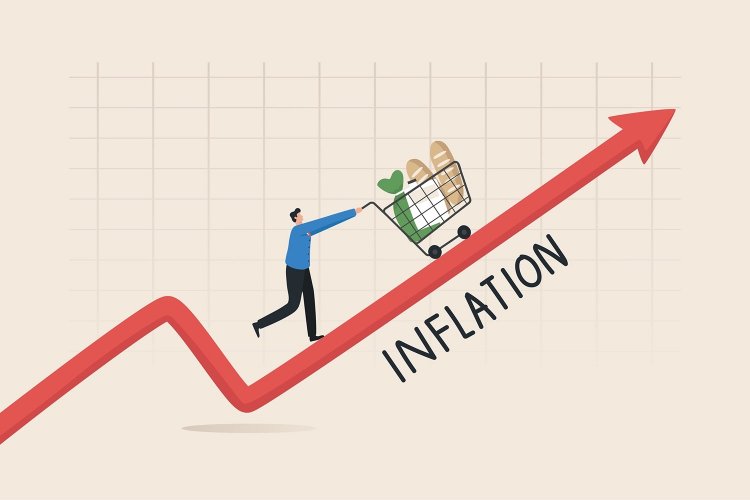Inflation skyrockets to 26.6pc in Oct, once again exceeding finance ministry’s forecast
Imran Ali Kundi

ISLAMABAD-Inflation rate was recorded at far higher level than the projection of the ministry of finance, jumping to 26.6 percent in October this year mainly due to higher food, oil and electricity prices and the impact of the recent floods.
Inflation measured through consumer price indicator (CPI) has once again increased to 26.6 percent in October after slowing down to 23.2 percent in September. Earlier, in August this year, the inflation had touched multi-decade high of 27.3 percent. On month on month basis, it has increased to 4.7 percent in October 2022 as compared to a decrease of 1.2 percent in the previous month (September), according to the latest data of Pakistan Bureau of Statistics (PBS).
The CPI inflation Urban increased by 24.6 percent on a year-on-year basis in October 2022. Meanwhile the CPI inflation for Rural has enhanced by 29.5 percent. The Sensitive Price Index (SPI), which gauges rates of kitchen items on a weekly basis, increased by 28.63 percent. On a monthly basis, Wholesale Price Index (WPI) inflation on YoY basis increased by 37.72 percent in October 2022. Inflation has gone beyond the projection of the ministry of finance. “The declining international commodity prices are expected to offset the inflation spikes that emerged due to domestic supply shocks. Nevertheless, it can be expected that YoY CPI inflation in the month of October will maintain its declining tendency observed in September. It is expected that CPI inflation will remain in the range of 21- 22.5%,” the ministry has noted in its monthly report. However, inflation has touched 26.6 percent in October, far high than the projection of the ministry of finance.
It has further noted that in October 2022, international oil prices continued to decline. International food prices have been experiencing a decline during the previous three months. Furthermore, the broad money developments seem to be compatible with lower and stable inflation. On the other hand, the exchange rate in terms of Pakistani rupees to the US dollar has started appreciating. Thus, in the month under discussion, the local average prices of basic goods declined as compared to September which is likely to reduce CPI inflation. Moreover, the supply disruption in view of recent floods have resulted in a shortage of perishable food items which are posing risks of higher inflation. The inflationary risks have partially been alleviated due to timely decisions to import perishable items by waiving off the customs duties.
Administrative measures are also being taken to control price speculation to ease out inflation. In addition, the reversal of rupee depreciation after the government’s action against private banks involved in artificially jacking up dollars assisted in strengthening the rupee against the dollar. Moreover, the declining international commodity prices are expected to offset the inflation spikes that emerged due to domestic supply shocks. Nevertheless, it can be expected that YoY CPI inflation in the month of October will maintain its declining tendency.
The break-up of inflation of 26.56 percent showed that food and non-alcoholic beverages prices increased by 36.24 percent last month. Similarly, health and education charges went up by 16.23 percent and 10.88 percent, respectively. Similarly, prices of utilities (housing, water, electricity, gas and fuel) increased by 11.92 percent in the last month. Meanwhile, the prices of alcoholic beverages and tobacco went up by around 34.63 percent. Prices of clothing and footwear increased by 18.28 percent and furnishing and household equipment maintenance charges 27.61 percent. Recreational charges and those related to culture went up by 23.65 percent in the period under review, while amounts charged by restaurants and hotels by 30.38 percent in October 2022 as compared to the same month last year. In urban areas, the food items which saw their prices increased during October 2022 included onions (67.73 percent), tomatoes (40.73 percent), fresh fruits (10.98 percent), tea (9.82 percent), fresh vegetables (9.55 percent), wheat flour (8.9 percent), dry fruits (6.04 percent), dessert preparation (5.14 percent), chicken (3.98 percent), meat (2.09 percent), rice (1.56 percent), pulse moong (1.28 percent), milk fresh (1.21 percent), beans (1.02 percent) and sugar (0.36 percent).
In non-food commodities, prices of following commodities enhanced: electricity charges (89.59 percent), woolen cloth (6.15 percent), household servant (5.01 percent), and construction input items (2.72 percent), household equipments (1.96 percent), solid fuel (1.74 percent), house rent (1.08 percent) and construction wage rates (0.29 percent). In urban areas, prices of following items were reduced: pulse masoor (10.29 percent), pulse mash (2.73 percent), cooking oil (2.7 percent), mustard oil (1.84 percent), pulse gram (1.77 percent), gram whole (1.48 percent), potatoes (1.46 percent) and vegetable ghee (0.33 percent).
In rural areas, prices of following commodities increased: tomatoes (38.4 percent), fresh vegetables (16.45 percent), wheat flour (15.21 percent), tea (14.77 percent), fresh fruits (13.05 percent), wheat (10.14 percent), potatoes (4.38 percent), chicken (3.8 percent), pulse gram (1.99 percent), pulse moong (1.83 percent), dry fruits (1.75 percent), mustard oil (1.71) rice (1.44 percent), pulse mash (1.12 percent), milk fresh (1.12 percent), meat (0.42 percent) and sugar (0.27 percent).
- Imran Ali Kundi
https://www.nation.com.pk/E-Paper/islamabad/2022-11-02/page-8/detail-0
Disclaimer: This page expresses the views of the author. We publish it on this site for discussion
– Senthalam news section












